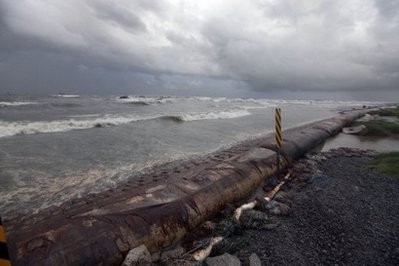A strengthening tropical storm forced the suspension of skimming from the Gulf of Mexico oil spill as Vice President Joe Biden heard complaints about the pace of cleanup efforts in the disaster zone.
Ten weeks after the BP-leased Deepwater Horizon platform exploded, setting off the worst environmental disaster in US history, Biden was given an earful from Louisiana governor Bobby Jindal about the slow response.
Countless birds and 413 miles (664 kilometers) of once-pristine shorelines have been oiled since the rig sank on April 22.
Since then crude has gushed at an alarming rate into the Gulf of Mexico and leaving the region's vital fishing and tourism industries reeling.

Meanwhile the State Department announced that the United States will accept offers from 12 foreign countries to help clean up and contain the spill.
Offers of boom have been accepted from Canada, Mexico, Norway and Japan; skimmers have been accepted from Mexico, Norway, France and Japan; and a sweeping arm system has been accepted from the Netherlands, a spokeswoman told AFP.
On his trip to the region, Biden was greeted by protesters holding signs reading "oil kills" as he entered a command center in New Orleans for an hourlong briefing before meeting with local fishermen.
He also traveled to the Florida panhandle, where the slick has forced authorities to close down some of the area's fabled postcard-inspiring sugar white sand beaches.
Jindal, a Republican who has been highly critical of the federal response, asked Biden for help cutting through red tape and deploying more resources to keep the oil from coating fragile coastal wetlands and fishing grounds.
"The federal government needs to increase their sense of urgency," Jindal said in a statement after meeting with Biden.
"They need to treat this spill like a war and get in it to win it. We're here to defend our way of life."
At the leak site 50 miles (80 kilometers) offshore, winds of up to 22 knots churned up large waves that made it too rough for crews to deploy a third vessel set to nearly double the capacity of BP's containment system.
The now-delayed Helix Producer was set to increase the capacity to gather the gushing oil to between 40,000 and 50,000 barrels per day by early July, from the current 25,000 barrels.
The current containment system is capturing nearly 25,000 of the estimated 30,000 to 60,000 barrels of crude spewing out of the ruptured well every day.
That could all end up gushing directly into the sea if Alex -- which is forecast to pass hundreds of miles from the site and strike near the Texas-Mexico border late Wednesday -- changes path and threatens a more direct hit on the spill site.
Coast Guard Admiral Thad Allen, who is overseeing disaster response efforts, told reporters Monday that even the threat of gale force winds -- upward of 45 miles (72 kilometers) per hour -- would be enough to force drilling and containment ships to withdraw.
In the event of an evacuation, operations will be shut down for about two weeks to "take down the equipment, move it off to a safe place, bring it back and reestablish drilling," Allen said.
That would be another major setback for the ill-fated oil collection effort in the Gulf, and would probably delay until September the completion of relief wells designed to permanently plug the well.
An estimated 1.6 million to 3.6 million barrels of oil -- or 67 million to 153 million gallons -- have already poured into the Gulf from the ruptured wellhead some 5,000 feet (1,500 meters) below the surface.
BP hopes a new mooring system will make the containment cap deep down on the sea floor easier to disconnect and reconnect in the case of inclement weather -- a vital contingency as the Atlantic hurricane season gets into full swing.
At 0001 GMT, the US National Hurricane Center said Alex was near hurricane strength with maximum sustained winds of 70 miles (110 kilometers) per hour.
Tropical storm force winds currently "extend outward up to 175 miles (280 kilometers)" from the eye of the storm, the center said.
The first major storm of the Atlantic season earlier dumped heavy rains across Mexico's Yucatan peninsula, after having killed at least 11 people in Nicaragua, Guatemala, Mexico and El Salvador.
The rough seas have already shifted parts of the slick closer to sensitive areas in Florida and Louisiana and could also push the oil deeper into fragile coastal wetlands.
Waves at the site of the sunken BP-leased Deepwater Horizon rig were up to seven feet (two meters), a Coast Guard spokesman told AFP Tuesday and cleanup operations were also impacted.
"They are still doing dispersant flights, but no skimming and no burning," the spokesman said.
























